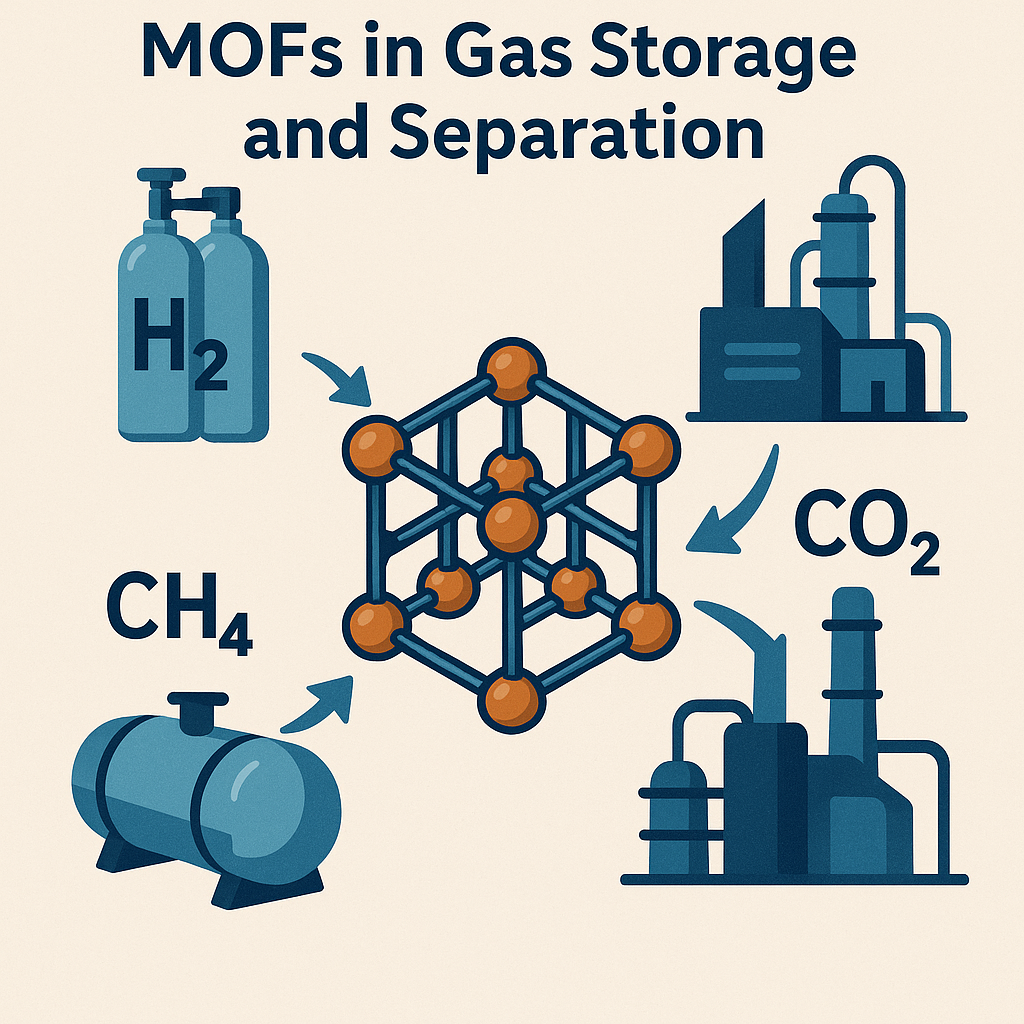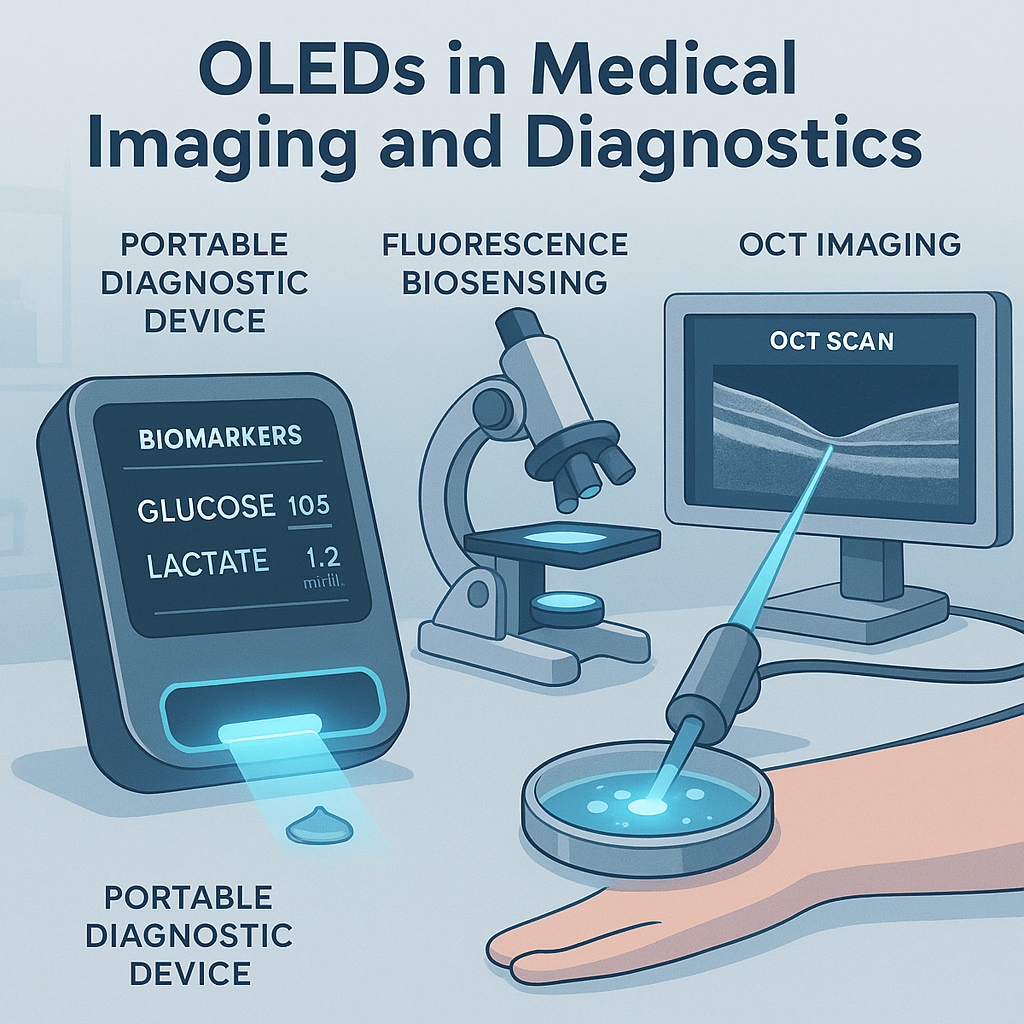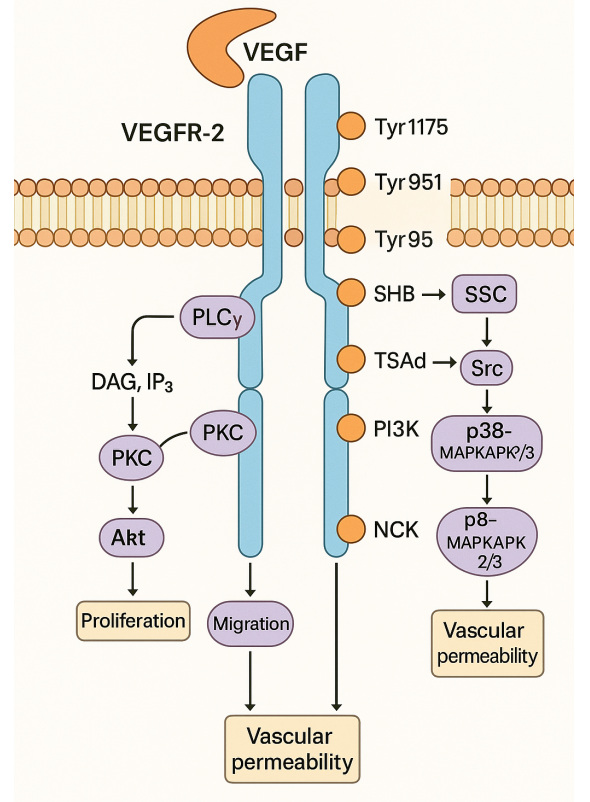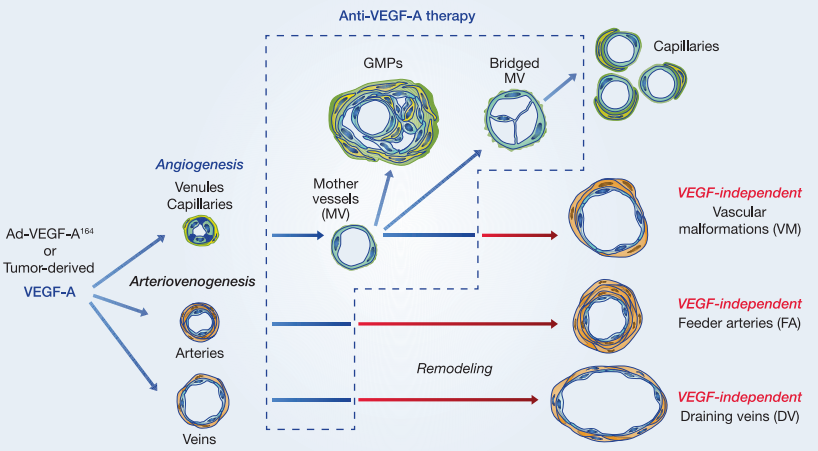AOD-9604: The Fat-Burning Peptide Explained
Abstract
AOD-9604 is a synthetic peptide derived from the 177–191 amino acid sequence of human growth hormone (hGH). This fragment is designed to stimulate lipolysis (fat breakdown) and inhibit lipogenesis (fat formation) without elevating IGF-1 or affecting glucose metabolism. Its unique action may support localized fat loss, metabolic regulation, and joint recovery, making it a promising tool for obesity-related research. Although available in wellness settings, AOD-9604 is not FDA-approved and should be used strictly in research contexts. This article explores its mechanism, benefits, safety, and comparisons with other fat-loss peptides.
Introduction
AOD-9604 is gaining popularity as a potential fat-burning peptide in the world of weight management and anti-aging. Originally developed as an anti-obesity drug, AOD-9604 is a synthetic fragment derived from human growth hormone (hGH), specifically the 177-191 amino acid sequence. Unlike full hGH, it focuses solely on lipolysis (fat breakdown) and lipogenesis inhibition (preventing fat formation) without significantly affecting blood sugar levels or increasing IGF-1.
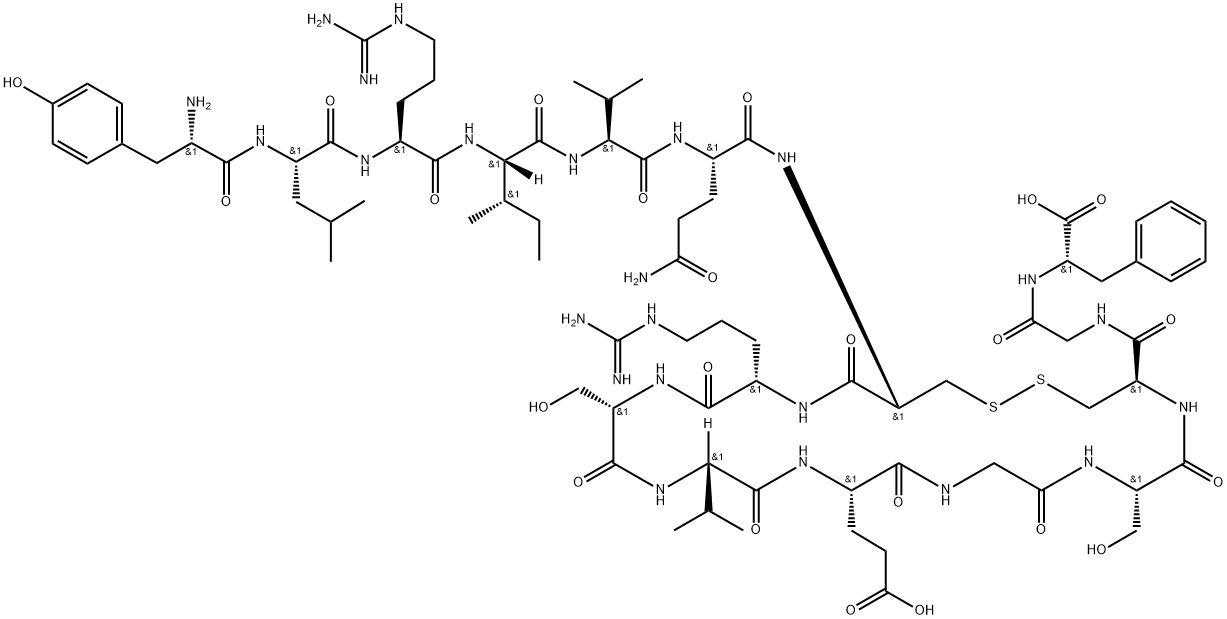
Fig.1 Structure of AOD-9604
With obesity and metabolic disorders on the rise, peptides like AOD-9604 are attracting attention for their potential role in weight loss and fat metabolism. Research suggests that AOD-9604 may activate beta-3 adrenergic receptors in fat cells, leading to enhanced fat oxidation. This mechanism allows individuals to experience fat reduction without the muscle growth or insulin resistance risks often associated with full-spectrum growth hormone therapies.
In addition to weight loss, some studies propose that AOD-9604 may aid in cartilage repair, joint recovery, and anti-inflammatory effects, making it a potential therapeutic option beyond fat reduction. However, despite its promising mechanisms, AOD-9604 is not FDA-approved for medical use. It remains banned in professional sports by the World Anti-Doping Agency (WADA) but is available for research purposes and in select wellness clinics.
This article will dive deep into the benefits, side effects, dosage, and legality of AOD-9604, exploring whether this peptide is truly an effective solution for fat loss or just another overhyped weight loss compound.
What is AOD-9604?
AOD-9604 is a synthetic peptide derived from human growth hormone (hGH), specifically from amino acids 177-191 of the hGH molecule. This fragment was identified as the portion of growth hormone responsible for fat metabolism while excluding the broader anabolic and metabolic effects associated with full hGH. AOD-9604 was originally developed as a potential anti-obesity drug due to its ability to promote fat loss without significantly impacting muscle growth or insulin levels.
Unlike traditional human growth hormone therapy, which can cause increased levels of insulin-like growth factor-1 (IGF-1) and affect blood sugar regulation, AOD-9604 is designed to target fat cells directly. Research suggests that it works by stimulating lipolysis (fat breakdown) and inhibiting lipogenesis (fat accumulation), particularly in stubborn fat deposits such as the abdomen and thighs. This makes it appealing to those looking for non-stimulant-based fat reduction solutions.
AOD-9604 is commonly categorized as a growth hormone fragment (GHF), meaning that while it originates from the hGH structure, it does not exhibit muscle-building effects. This distinguishes it from other peptides like CJC-1295 and Ipamorelin, which stimulate natural growth hormone release. Instead, AOD-9604 mimics the metabolic benefits of hGH while reducing concerns over potential long-term side effects, such as insulin resistance or excessive tissue growth.
Despite its promising applications, AOD-9604 remains unapproved by the FDA for weight loss or clinical use. However, it is available in research settings and wellness clinics, where it is often marketed as an experimental peptide for fat loss and metabolic enhancement.
How Does AOD-9604 Work? (Mechanism of Action)
AOD-9604 functions by mimicking the fat-burning effects of human growth hormone (hGH) while avoiding its broader metabolic influences. It is derived from the 177-191 amino acid sequence of hGH, which is responsible for stimulating fat metabolism without affecting muscle growth, blood sugar regulation, or insulin-like growth factor-1 (IGF-1) levels.
Key Mechanisms of Action:
Stimulates Lipolysis (Fat Breakdown)
AOD-9604 activates beta-3 adrenergic receptors in adipose (fat) tissue, triggering the release of stored fatty acids for energy use.
This process enhances fat oxidation, making it easier for the body to burn stubborn fat.
Inhibits Lipogenesis (Fat Accumulation)
Unlike traditional weight loss methods that rely solely on calorie restriction, AOD-9604 directly prevents new fat deposits from forming.
It suppresses the action of lipogenic enzymes, reducing the body’s ability to store excess calories as fat.
No Impact on IGF-1 or Blood Sugar Levels
Unlike full hGH, which can lead to increased IGF-1 and insulin resistance, AOD-9604 does not interfere with glucose metabolism.
This makes it a potentially safer option for individuals concerned about insulin sensitivity or diabetes risk.
Localized Fat Reduction (Targeting Stubborn Fat Areas)
Some research suggests that AOD-9604 may preferentially act on specific fat deposits, such as abdominal fat, making it a desirable option for body recomposition.
AOD-9604’s selective action on fat metabolism rather than overall growth hormone function makes it a unique peptide. Unlike other GH-releasing peptides (GHRPs) like CJC-1295 and Ipamorelin, which stimulate the pituitary gland to release more hGH, AOD-9604 works independently of natural hGH secretion.
While clinical studies have demonstrated its fat-reducing potential, AOD-9604 has not been fully validated as an FDA-approved weight loss therapy. Nonetheless, its mechanism offers an alternative approach for individuals struggling with stubborn fat loss, particularly when combined with a proper diet and exercise regimen.
Potential Benefits of AOD-9604
AOD-9604 has gained attention for its fat-burning properties, but its potential benefits extend beyond simple weight loss. As a modified fragment of human growth hormone (hGH), this peptide focuses on fat metabolism without the typical side effects associated with full hGH therapy, such as insulin resistance or increased IGF-1 levels. While research is still ongoing, several key advantages have been identified.
1. Fat Loss & Weight Management
AOD-9604 is primarily known for its lipolytic (fat-burning) effects. Studies suggest that it:
Promotes fat breakdown by activating beta-3 adrenergic receptors, leading to the release of fatty acids.
Prevents fat accumulation by inhibiting lipogenesis, making it harder for the body to store excess fat.
Targets stubborn fat areas, such as the abdomen and thighs, potentially making it effective for body recomposition.
2. No Impact on IGF-1 or Blood Sugar Levels
Unlike full growth hormone therapy, which can increase IGF-1 and affect glucose metabolism, AOD-9604:
Does not elevate IGF-1 levels, reducing the risk of unwanted anabolic effects or organ enlargement.
Does not interfere with insulin sensitivity, making it potentially safer for individuals at risk of diabetes or metabolic disorders.
3. Potential Cartilage & Joint Repair Benefits
Some researchers propose that AOD-9604 may aid in cartilage regeneration and joint recovery, potentially helping individuals with:
Osteoarthritis or cartilage degradation
Injury recovery, particularly in athletes
Post-exercise inflammation reduction
4. Anti-Inflammatory Properties
Emerging research suggests that AOD-9604 may have mild anti-inflammatory effects, which could:
Help reduce chronic inflammation associated with obesity.
Improve muscle recovery in physically active individuals.
Support better overall metabolic function.
5. No Reported Negative Effects on Muscle Mass
Since AOD-9604 does not increase IGF-1 levels, it does not promote muscle hypertrophy like full hGH. This makes it ideal for individuals who want fat loss without significant muscle growth.
Final Thoughts on AOD-9604’s Benefits
AOD-9604 is an exciting fat-burning peptide with the potential for targeted fat loss, metabolic benefits, and joint repair. However, despite these promising advantages, clinical research is still limited, and FDA approval has not been granted. Individuals considering its use should consult a healthcare professional to weigh its benefits against possible risks.
Is AOD-9604 Safe? (Side Effects & Risks)
AOD-9604 is generally considered safe and well-tolerated, but like any peptide, it comes with potential side effects and risks. While research indicates that it does not significantly impact growth hormone levels, IGF-1, or glucose metabolism, long-term studies on its safety are still limited. Understanding both its short-term and long-term effects is essential before considering its use.
1. Commonly Reported Side Effects
Most users experience mild and temporary side effects, including:
Injection site reactions – Redness, swelling, or irritation at the injection site.
Headaches – Some users report mild headaches, possibly due to metabolic changes.
Nausea or dizziness – A temporary side effect in some individuals.
2. Potential Long-Term Risks
Although AOD-9604 does not increase IGF-1 levels, there are concerns about its long-term metabolic effects, including:
Unknown impact on fat metabolism regulation – Since AOD-9604 alters fat-burning pathways, researchers are still investigating whether prolonged use could affect natural fat metabolism.
Potential insulin sensitivity changes – While no direct evidence suggests a negative effect on blood sugar, some peptides may affect insulin signaling over time.
Insufficient human clinical data – Most research on AOD-9604 has been conducted in animals or short-term human trials, making it difficult to determine its full long-term effects.
3. Who Should Avoid AOD-9604?
While generally safe, certain individuals should avoid AOD-9604, including:
Pregnant or breastfeeding women – Due to limited safety data.
Individuals with metabolic disorders – People with diabetes or insulin resistance should consult a doctor before use.
Those with a history of cancer – Since growth hormone-related peptides can influence cell signaling, individuals with a history of tumors should exercise caution.
4. AOD-9604 Compared to Full HGH Therapy
AOD-9604 does NOT increase IGF-1, making it safer for long-term use compared to hGH.
Does not promote muscle growth, making it ideal for fat loss without bulk gain.
Has fewer hormonal effects, reducing the risk of organ enlargement or glucose intolerance.
Final Verdict on AOD-9604 Safety
While AOD-9604 appears to be a safer alternative to traditional hGH therapy, its long-term effects remain unclear. Those considering it should consult a healthcare professional before use and monitor for any potential side effects. As with any peptide therapy, proper dosage, cycle length, and medical supervision are crucial for safety.
AOD-9604 vs. Other Fat Loss Peptides
AOD-9604 is often compared to other fat loss peptides and growth hormone-related compounds. While it has gained popularity due to its ability to stimulate fat metabolism without increasing IGF-1 levels, it’s essential to understand how it differs from other peptides like hGH, CJC-1295, Ipamorelin, and Semaglutide (Ozempic).
AOD-9604 vs. Human Growth Hormone (hGH)
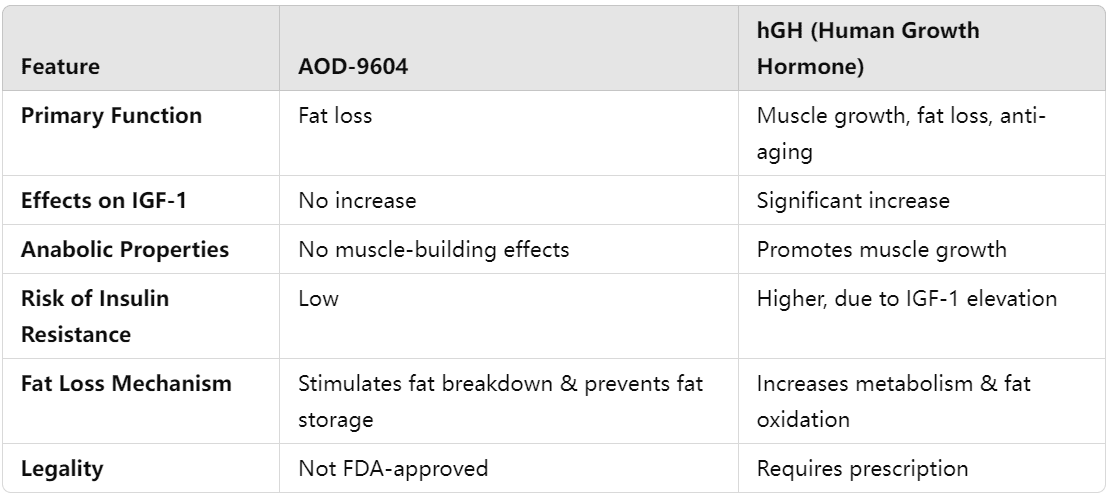
AOD-9604 is safer for fat loss, while hGH is better for muscle gain and anti-aging but comes with more risks.
AOD-9604 vs. CJC-1295 & Ipamorelin (GH Secretagogues)
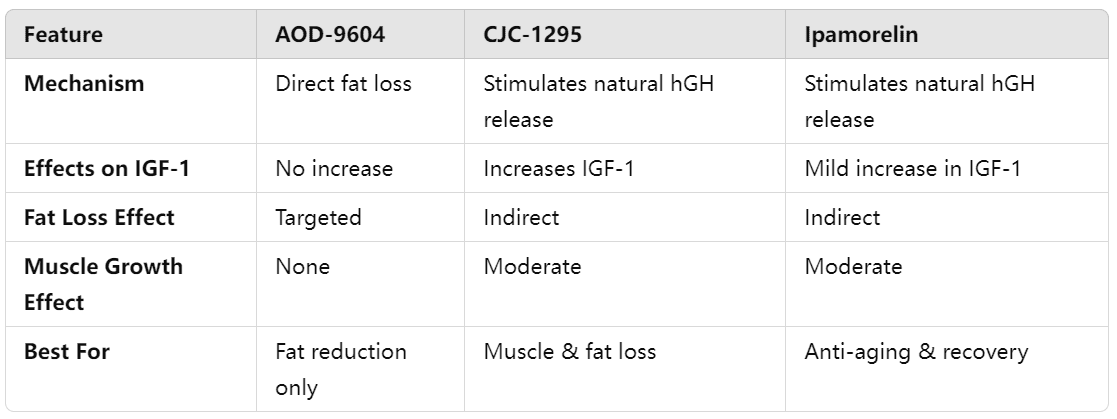
CJC-1295 & Ipamorelin are better for muscle recovery & GH optimization, while AOD-9604 is strictly for fat loss.
AOD-9604 vs. Semaglutide (Ozempic) for Weight Loss

Semaglutide is better for appetite suppression & weight loss, while AOD-9604 is better for fat burning without muscle loss.
Which One is Best?
If your goal is pure fat loss without muscle growth, AOD-9604 is a great option.
If you want both fat loss and muscle-building, CJC-1295 or Ipamorelin are better.
If you need weight loss through appetite suppression, Semaglutide (Ozempic) is superior.
If you’re looking for overall body transformation, hGH therapy may be the best option (but comes with risks).
Since each peptide has different effects, stacking them may provide better results. However, always consult a healthcare professional before use.
Conclusion: Is AOD-9604 Worth It?
AOD-9604 is a promising peptide for individuals seeking targeted fat loss without the risks associated with traditional growth hormone therapy. Unlike full hGH, it does not elevate IGF-1 levels, making it a potentially safer alternative for fat reduction. By stimulating lipolysis (fat breakdown) and inhibiting lipogenesis (fat accumulation), AOD-9604 offers a unique non-stimulant approach to weight management.
While early research and anecdotal evidence suggest positive results, its long-term safety profile remains unclear due to limited human clinical trials. Additionally, AOD-9604 is not FDA-approved for weight loss, and its legality varies depending on the country. It is banned in professional sports by WADA but remains available in research and wellness clinics.
For those considering AOD-9604, it’s important to manage expectations—it is not a magic weight-loss solution but can be a helpful fat-burning tool when combined with a proper diet and exercise regimen. As with any peptide therapy, consulting a healthcare professional before use is essential to ensure safety and effectiveness.
Ultimately, AOD-9604 stands out as a specialized fat-loss peptide, but its effectiveness and long-term impact require further research before it can be widely recommended for clinical use.
References
- Orlovius AK, Thomas A, Schänzer W, Thevis M. (2013). AOD-9604 does not influence the WADA hGH isoform immunoassay. Drug Test Anal, 5(11-12), 850-852. Link
- Cox HD, Smeal SJ, Hughes CM, Cox JE, Eichner D. (2015). Detection and in vitro metabolism of AOD9604. Drug Test Anal, 7(1), 31-38. Link
- Kwon DR, Park GY. (2015). Effect of Intra-articular Injection of AOD9604 with or without Hyaluronic Acid in Rabbit Osteoarthritis Model. Ann Clin Lab Sci, 45(4), 426-432. Link

